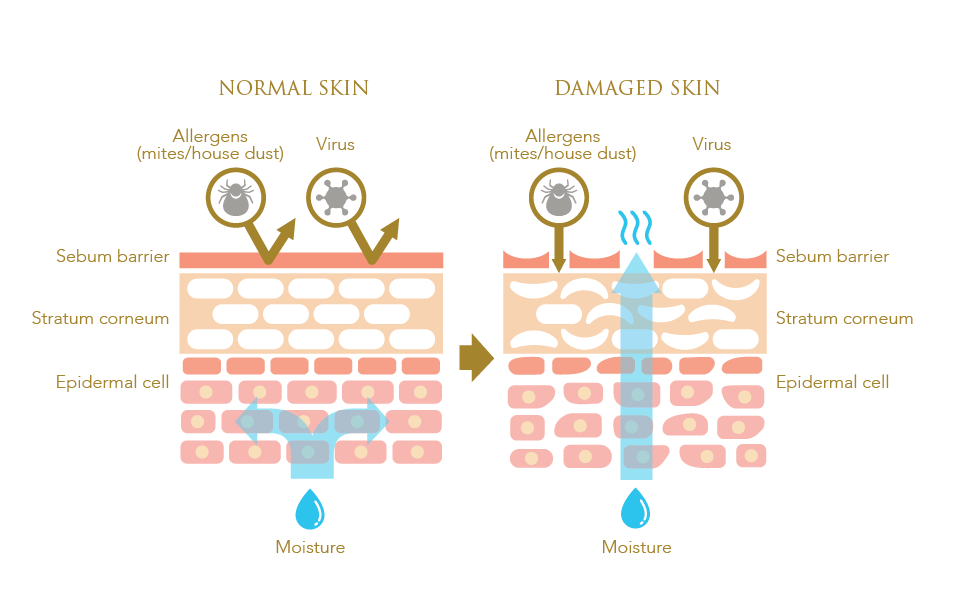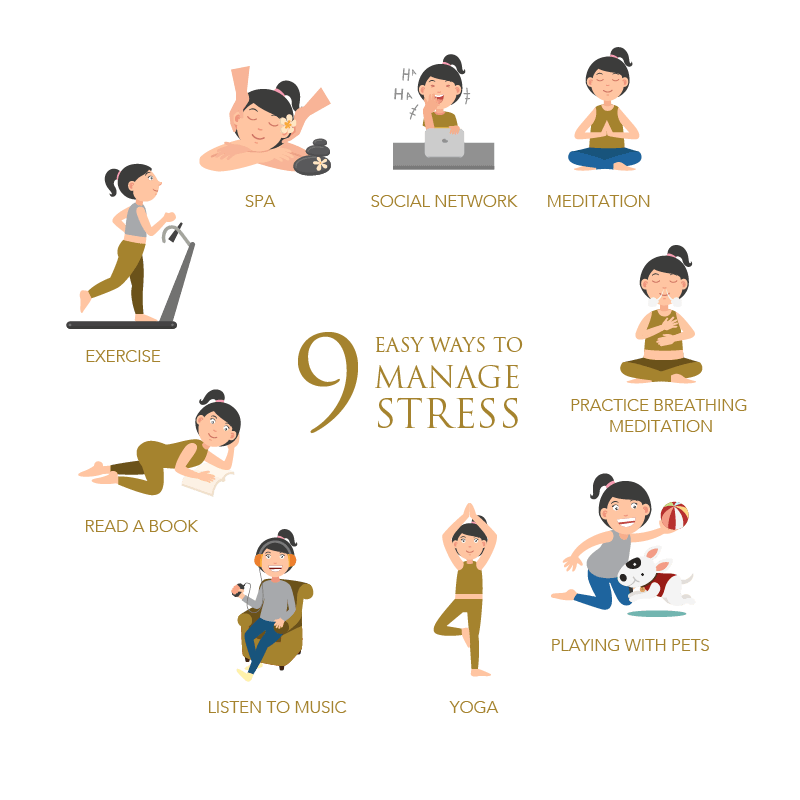Can Stress Cause Eczema Flare-Ups?

Eczema is a term that refers to a few different skin conditions, with symptoms usually manifesting as dry, red and itchy skin. While there are a number of triggers that can cause eczema to flare up, experts have been saying for years that stress is a huge contributing factor to this, and can really exacerbate the skin condition.
Is that true?
Find out below…
Does Stress Really Have an Effect on Eczema?
The straight answer is yes, stress has quite the effect on eczema, as well as the overall health of your skin.
When you are feeling stressed, you will experience exacerbations in all of the eczema symptoms you usually have to deal with, including:
- Itchiness
- Inflammation
- Sensitive skin
- Dark patches of skin
- Swelling
- Scaly skin
- Crusty or oozing skin
How Exactly Does Stress Exacerbate Eczema?
There are a number of ways in which stress can cause eczema flare-ups, and these are all down to the effect that stress has on other parts of the body.
Let’s begin with the immune system…
Eczema is an autoimmune disease, which is why doctors often prescribe immunosuppresant medications for the condition.
While these do reduce the way in which the immune system responds to triggers, they do this in quite a controlled way, because if your immune system is too suppressed, then this will end up making you more vulnerable to triggers.
Each time your body experiences stress, it sends the stress hormone, known as cortisol, shooting through your body. If this only happens occasionally, it is not a problem, but when it happens regularly and frequently, this is then referred to as chronic stress.
When chronic stress is experienced, the high amounts of cortisol in your body end up damaging the cells in your immune system, making it much weaker, and leaving your body, and your skin, more exposed.
As you can imagine, this only ends up having a negative effect on eczema. A weakened immune system means that your body and skin are going to react so much more strongly to any triggers, exacerbating your symptoms.
This is not the only way in which stress affects your immune system, which then affects your skin…
Each time you experience feelings of stress, your immune system responds to this with inflammation, as this is its way of trying to protect the skin.
As you likely already know, inflammation is something that those who suffer from eczema really need to avoid.
Another way in which stress causes eczema flare-ups is through the way in which it affects the health of your gut…
Did you know that more than 70% of your immune system is actually located in your gut?
This is the reason why, when many people are stressed, they tend to experience constipation or diarrhoea too.
Wondering why this actually happens?
It is because of the way in which your body goes into fight or flight mode when you are stressed. Your nervous system does not prioritize breaking down the food in your body, meaning it either ends up emptying your bowels or retaining all of your waste.
How does this have anything to do with eczema?
Well, if your bowels are emptied more often, this causes your body to lose a significant amount of fluids. This dehydration and dryness will then exacerbate your eczema symptoms.
When it comes to constipation, this means that not only is your waste trapped in your body, but so are the toxins within this. These toxins trigger an inflammatory process within you, which will worsen your eczema.
Stress and the Skin’s Protective Barrier

Mentioned above are some of the indirect ways in which stress can cause eczema flare-ups, but it also does this in direct ways too.
Your skin’s protective barrier lies on the outer layer of your skin, and has three main jobs:
- Trapping water molecules into the skin, and preventing them from evaporating out
- Preventing the skin’s natural moisturizing compounds, such as amino acids and natural sugars, from leaching out of the skin
- Preventing unwanted substances from the environment from entering the skin
Research has shown that those with eczema also have a defect in their skin barrier. This is why the skin is so easily broken and damaged, meaning that irritants enter the skin more frequently and trigger eczema flare-ups.
If you already have eczema, then you likely already know this, and are probably wondering what this has to do with stress…
Well, studies show that stress has a direct effect on the skin’s protective barrier, causing damage to this and preventing it from functioning optimally.
With the skin’s barrier already more compromised in those who suffer from eczema, causing more damage to the barrier is definitely not going to do your eczema any favors.
Can Stress Cause Eczema to Develop in Someone Who Does Not Already Suffer From it?
Eczema is referred to as a psychodermatologic disorder, which means that although it is a physical condition, it is significantly tied to emotional health too.
With there being such a strong connection between stress and eczema flare-ups, many experts started to question whether stress may actually cause the condition to develop in the first place.
However, further research suggests that this is not the case…
Stress does not cause eczema to develop in someone who has never suffered from it before, but it does definitely worsen the symptoms in those who already have the condition.
The Link Between Stress, Eczema and Pregnancy
If you suffer eczema and are pregnant, then you need to be even more aware of the effects that stress and eczema could have on your baby.
Eczema is extremely common in children.
Why?
Because a baby’s skin is so hypersensitive to all of the triggers around it, causing it to react with eczema symptoms. However many children tend to grow out of this before they reach adulthood.
How is this connected to the actual pregnancy?
A groundbreaking study carried out in 2012 in Japan discovered that 47% of eczema cases in babies is actually due to stress experienced by their mothers during pregnancy.
This means that, if you are pregnant, feeling stressed will not only trigger your own eczema to flare up, but will also increase the likelihood that your child will experience eczema flare-ups too.
Soothing a Stress-Induced Eczema Flare-Up
Are you experiencing a flare-up in your eczema due to stress?
There are several different steps that you can take to soothe and calm your skin, minimizing your symptoms, such as:
- A doctor’s prescription for a steroid cream, which can stop your skin from itching and clear away any rashes
- Taking oral antihistamines to stop itching, as well as help with sleep if your eczema flares up more at night
- Keep your skin moisturized, as dry skin will only make eczema worse
- Take a bath will oatmeal or Epsom salts
- Keep your fingernails short and filed smooth, because unknowingly scratching at your skin while you sleep will exacerbate your flare-up
- Keep your body cool, and make sure that your bedroom is well-ventilated
- Apply pure aloe vera gel to your skin twice a day
- Antibiotics may be needed if you have scratched your skin and broken it. This will prevent an infection, which would only make your eczema worse
The treatment option/s you opt for should depend on how severe your eczema is.
Managing Your Stress Levels

While there are many steps that you can take to soothe your skin during an eczema flare-up, it goes without saying that prevention is better than cure.
This means learning how to manage your stress levels and keep them well under control.
Does this sound impossible?
There are actually quite a few scientifically-proven ways to reduce stress.
Want to know what these are?
The first is exercising, and this needs to be done every single day in order for it to really have an effect.
Don’t believe that a little exercise can really make such a big difference?
There are countless studies out there that prove this. In fact, recent studies have even shown that when you work on strengthening your muscles, this causes them to release enzymes that detoxify the body of the substances that stress and inflammation cause.
Exercise also encourages your brain to release endorphins, which are the feel-good chemicals that boost the mood.
Finally, just the repetitive motion that comes with exercise works in a similar way to meditation, calming the mind.
Even if you do not enjoy exercising, there are plenty of ways to get active that do not involve a sport or going to the gym. Try taking a brisk walk with a friend every evening, taking the stairs instead of the elevator, or finding a hobby that involves you staying on your feet for a while.
Another proven way to reduce stress levels is by doing some breathing exercises. These will not only help to calm you down, but will also boost your mood, helping you to see things more positively.
Want to give this a try?
There are so many breathing exercises out there, but one of the most effective is the 4-7-8 method.
Here are the steps to follow:
- Place the tip of your tongue behind your upper teeth and keep it there throughout the exercise
- Exhale completely through your mouth, forcing it to make a whooshing sound
- Close your mouth and then breathe in through your nose, counting to four in your head
- Then, hold your breath for seven counts
- Exhale again, using your mouth rather than your nose, and do this for eight counts
This counts as one breathing cycle, so once you have done this, you can then repeat the exercise a few more times. It does not matter so much how long you do the exercise for, so long as you stick to the 4-7-8 ratio.
How exactly does this breathing exercise help with stress?
It works like a natural tranquilizer for your nervous system, and actually becomes more powerful the more you do the exercise.
Here are a few other ways in which you can reduce your stress levels:
- Unplug – there is a strong link between stress levels and how often one checks their phone or computer, so try to unplug yourself for a small amount of time each day
- Friendships – spending time with friends can help to lower stress levels
- Omega-3 Fatty Acids – consuming more foods that contain omega-3 fatty acids, such as oily fish, chia seeds and flaxseed, can reduce the stress-induced inflammation within the body. These will also help to moisturize and nourish your skin, while strengthening your skin’s protective barrier, which always helps those who have eczema
- Read a Book – research shows that reading fiction can actually reduce stress levels by up to 68%, which actually makes this method even more effective than going for a walk or listening to some calming music, or even drinking some calming tea
As always, prevention is better than cure, so it always helps to target your stress levels before they become too high.
How can you do this?
By identifying the way in which you personally respond to stress. If you find yourself biting your fingernails, tapping your feet or hands, sweating, or anything else that you do when you are stressed, then this is a sign to immediately give one of those stress-relieving methods a try, before your stress becomes worse and has an effect on your eczema.
There is no denying the strong connection between stress and eczema flare-ups, and there are so many studies out there that prove just how bad stress can be for those who suffer from the skin condition. While there are a number of ways in which you can soothe your stress-related eczema flare-ups, cutting back on the amount of stress you experience in the first place is the best way to go, meaning that, if you suffer from stress-induced eczema, this should really be your priority.

